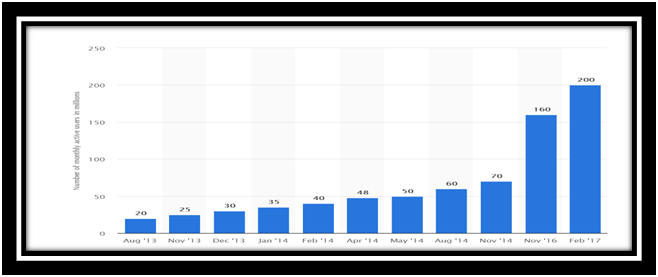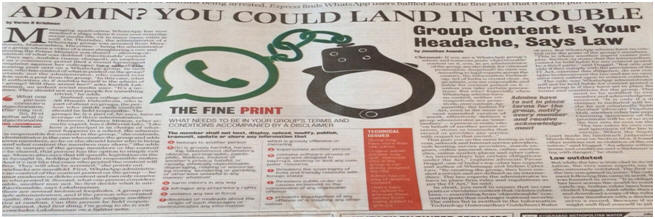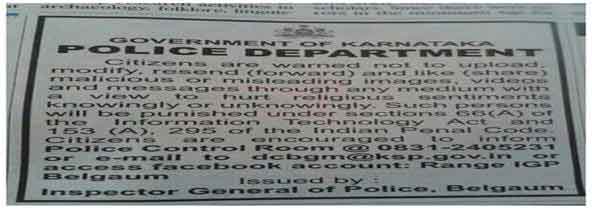Utility of WhatsApp a Major Risk
It was again on this 20th of November 2017 when a news was published about an eighteen year old Zakir Ali Tyagi, a Muzaffarnagar teen who has spent 42 days in jail due to his comments and posts on Facebook. He was picked up by the police and booked under Section 420Author Name: shreya.mazumdar
It was again on this 20th of November 2017 when a news was published about an eighteen year old Zakir Ali Tyagi, a Muzaffarnagar teen who has spent 42 days in jail due to his comments and posts on Facebook. He was picked up by the police and booked under Section 420
Oh! It Happens Again- Utility of WhatsApp, a Major Risk?
It was again on this 20th of November 2017 when a news[1] was published about an eighteen year old Zakir Ali Tyagi, a Muzaffarnagar teen who has spent 42 days in jail due to his comments and posts on Facebook.
He was picked up by the police and booked under Section 420 (cheating) of Indian Penal Code and Section 66 of the Information Technology Act. He was said to be brutally beaten and called a terrorist.
By the time he got released he had lost his job at a nearby steel plant. In another similar case, Meerut based journalist Afghan Soni was charged with defamation and “computer related offence” for posting a derogatory video of Narendra Modi, the Prime Minister of India.
WhatsApp is that widely used App where the tensions are stronger because the police keeps good check on Apps like this.
As WhatsApp is more frequently used App in 2017, the statistics of WhatsApp users have reached 200 Million active[2] users in India which is little more than the Facebook users, which has reached to 194.11 Million users in India.
So the police has altogether more reasons to surveil WhatsApp. WhatsApp has also brought in the attention of the users regarding the complicated laws that has been legislated in consequence to the widely used App.

The Background: Where did it all start?
Social Media arrests is becoming an old tale where arrests are caused reasoning it to be an annoyance, inconvenience, insult or injury online. If we refer back to the case of Shreya Singhal[3] judgment of the Supreme Court under Section 66A of Information Technology Act, 2000 (IT Act) where it was held that the provision was unconstitutional as it went against Article 19 of the Indian Constitution. The fact of the case was that, two ladies from Palghar, Maharashtra were arrested for posting a message on Facebook against criticizing Bal Thackeray’s state funeral. It was held by the Supreme Court that the action taken by the police was violative of the “Freedom of Expression” guaranteed by Indian Constitution. Thus, Section 66A was scraped off from the IT Act and declared as unconstitutional but similar kind of arrests have not stopped because of various other reasons. WhatsApp has also got into the ambit of such scope of the statutory provisions where WhatsApp admins needs to beware of the stringent rules which states ‘prohibiting Offensive contents in WhatsApp’ is a legal responsibility.

All About WhatsApp:
In order to understand as to how WhatsApp works one can check the FAQ on the WhatsApp website https://faq.whatsapp.com/en_US/.
In order to first install WhatsApp on the cell phone, it asks for permission to access data on the device such as the device ID., contact details etc. These are the privacy issues which the user agrees and downloads the App. As soon as the App id downloaded, there are the “Term of Services” which the user needs to “agree” upon and then enter the mobile number for verification. Once that is accepted it is difficult to revisit the Terms and one has to go back to the website to check the FAQs and other terms. In addition to that, in order to use the App, one has to “Agree” to these “Terms”, which is obvious and implied.
Apart from absolving itself from any responsibilities as to the contents, WhatsApp specifically states that,
“YOU SPECIFICALLY ACKNOWLEDGE THAT WHATSAPP SHALL NOT BE LIABLE FOR USER SUBMISSIONS OR THE DEFAMATORY, OFFENSIVE, OR ILLEGAL CONDUCT OF ANY THIRD PARTY AND THAT THE RISK OF HARM OR DAMAGE FROM THE FOREGOING RESTS ENTIRELY WITH YOU”
This clause releases WhatsApp from all the liabilities and takes all such liabilities is burdened on the user.
In the subject case, Police are not making WhatsApp a party to the dispute and only making a criminal charge on the “Administrator of a Group”. It is not clear if they consider the Administrator as a representative of the WhatsApp Company or a service provider himself who provides a service called “Group” on the platform provided by WhatsApp company.
While the Administrator is a user of the WhatsApp services and they are bound by the terms of WhatsApp, which has a cause of action against the creator of a group in an activity of the user which makes it convenient for him to exchange messages with a sub group in his/her contact list. Every WhatsApp group message is therefore attributed directly to the given mobile number and the Group admin has no role in “initiating the transmission of a message, selecting the receiver of the transmission (it goes to all the members of the group) and selecting or modifying the information contained in the transmission”.
In the event we presume that the “Group” is itself an intermediary service provided by the Administrator, the admin is entitled to protection under Section 79[4] if he observes “Due Diligence” and also if he takes expeditious action towards determination of whether a content is objectionable and is to be removed, after he is duly notified by a Court.
Accordingly, “Intermediary”[5] with respect to any particular electronic records, means any person who on behalf of another person receives, stores or transmits that record or provides any service with respect to that record and includes telecom service providers, network service providers, internet service providers, etc. which is also inclusive of social networking sites too.
Thus, in the subject case, the fact that the WhatsApp group is an intermediary itself is debatable. Even if so, the admin’s liability can only be counted from the time a Court order is served (may be we can dilute this to an order being served from the Police) and is limited to the removal of the content.
Police should remember that the admin should be presumed to be innocent until proven guilty. The responsibility of the admin in any investigation should be considered limited to the extent of providing the phone number of the person who has posted the objectionable content and it is the duty of the Police to trace the person using the KYC of the mobile service provider.
Although the IT Act, 2000 protects an intermediary from any liability under any law that is in force. Thus, an intermediary is required to carry out certain due diligence obligation and this includes monitoring contents that infringes intellectual property, threatens national security or public order, or is obscene or defamatory or violative any law in force[6]. An intermediary is liable for publishing or hosting such user generated content, however, as mentioned earlier, this liability is conditional. Section 79 of IT Act states that an intermediary would be liable only if it initiates transmission, selects receiver of the transmission and selects or modifies information contained in the transmission that falls under any category[7].
WhatsApp Real World Arrests:
The Latur Police in Maharashtra who arrested a WhatsApp group administrator for a content that was posted in the group. According to this report in Deccan Chronicle, a rumoured message was doing rounds, which included the following message:
‘3,000 armed men are roaming in parts of Solapur district with the intention of kidnapping children.’
The Police have booked a case using sections 153 of the IPC (promoting enmity and ill will), section 34 and section 67 of IT Act, 2000.These sections deals with a provocation or intention to cause riot[8], acts done by several person with common intention[9] which is for the harm of the society and also transmitting of obscene material in electronic form[10].
Goondas Act, 2004:
In the State of Karnataka one can even get arrested even before an offence under IT Act is even committed which is under the State Act called Goonda Act. Karnataka has brought most offences under the Information Technology Act, 2000 and Indian Copyright Act, 1957 which is under the ambit of Goonda Act. "The Goonda Act provides for preventive arrest. In the Information Technology Act and The Copyright Act, you have to commit the offence to be arrested. But here, you can be taken into preventive custody even before you commit the said offences. In normal arrests, you can straightaway apply for bail. But under the Goonda Act, you cannot. There is a long process of review and you will be in custody at least till then. The third impact is, you can have a history sheet started against you by the police. Technically, your slips on WhatsApp will attract the Goonda Act against you."
State governments have no power to say that an Act shall become an offence when it does not even have the power to regulate such an Act."

Analysis:
Firstly, an illegal act has to be committed in order for an action to be taken against an administrator of the group. For instance if the arrest was due to a provocation of riot using illegal act then there has to be involvement of several people in such an act and an that act has to be committed.
Secondly, the statute mentions that there has to be “Publication or Transmission of Obscene Electronic Contents”, unless that objectionable element has actually been published or transmitted.
Thus cases like Latur where the Latur police arrests WhatsApp administrators without proper basis is a gross misuse of law which should be questioned under the Human Rights Act, 1993.
Statute like the Goonda Act had received a lot of objections from the senior advocates sating it to be, “draconian piece of legislation” and it necessarily mocks at the institution of courts and lawyers. A completely unfathomable move has been made by Karnataka State Government where it has brought the offences of the Information Technology Act and Indian Copyright Act under the ambit of the Goonda Act.” It has also been mentioned that there is no constitutional basis for such State statutes. Although the statute still continues to exist in the state of Karnataka but the statistics of arrests for “digital offenders” under Goonda Act is nil.
Such steps are taken by the Indian Government as technology and its application is a new and evolving step. Internet and social media in virtual world can be a nightmare of the real world and something so vast which can reach and harm the entire nation in just few seconds has become a challenge in terms of law and justice. Information Technology is a new concept in this fast evolving world and laws and statues are falling short of its application and implementation. It is not just India but even for other countries, they are still new to the concept and trying to react to situations trying out various laws and its implementation. It is only with time a water tight solution to this aspect might evolve.
Therefore, these arrests that has happened or is happening due to stricter rules which might also present itself as unreasonable which is only due to unawareness and no experience of such situations. Therefore it is only with time such situation and problems might be brought under control and the present cases are just a work in progress in the making of history.
ISBN No: 978-81-928510-1-3
Author Bio: B.A. LL.B. Christ University, Bangalore LL.M. Symbiosis International University Associate Email: shreya.mazumdar@legalserviceindia.com
Email: shreya.mazumdar2012@gmail.com
Website: http://www.legalserviceindia.com
Views: 596
How To Submit Your Article:
Follow the Procedure Below To Submit Your Articles
Submit your Article by using our online form
Click here
Note* we only accept Original Articles, we will not accept
Articles Already Published in other websites.
For Further Details Contact:
editor@legalserviceindia.com
File Your Copyright - Right Now!

Online Copyright Registration in India
Call us at: 9891244487 / or email at: admin@legalserviceindia.com
File Divorce in Delhi - Right Now!
File Your Mutual Divorce -Call us Right Now at: 9650499965 / or email at: tapsash@gmail.com
Lawyers in India - Search By City |
|||
|
Delhi Chandigarh Allahabad Lucknow Noida Gurgaon Faridabad Jalandhar Vapi |
Mumbai Pune Nagpur Nashik Ahmedabad Surat Indore Agra Jalgaon |
Kolkata Siliguri Durgapur Janjgir Jaipur Ludhiana Dimapur Guwahati Amritsar |
Chennai Chandigarh Hyderabad Coimbatore Eluru Belgaum Cochin Rajkot Jodhpur |

